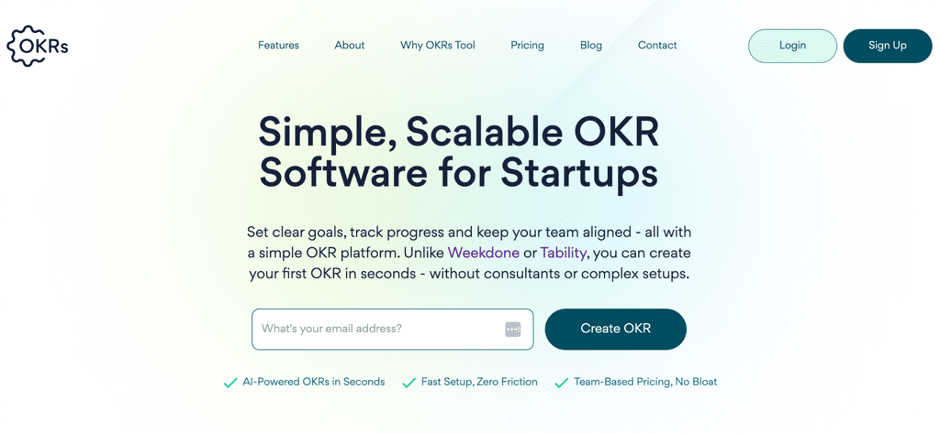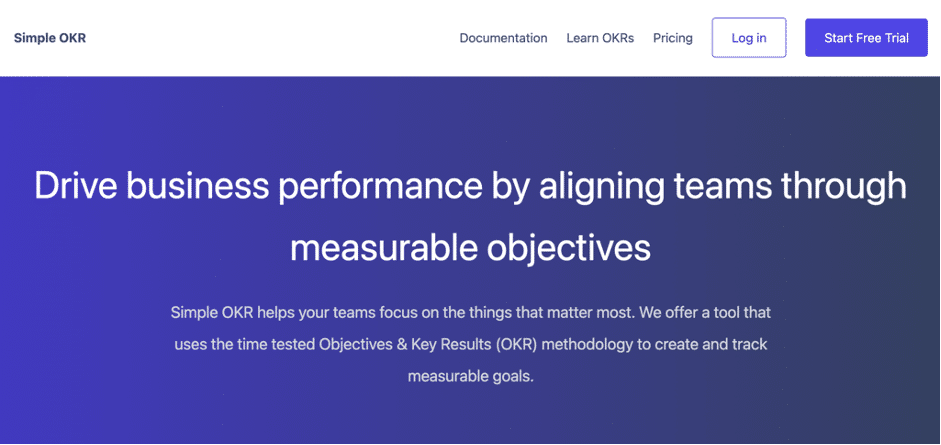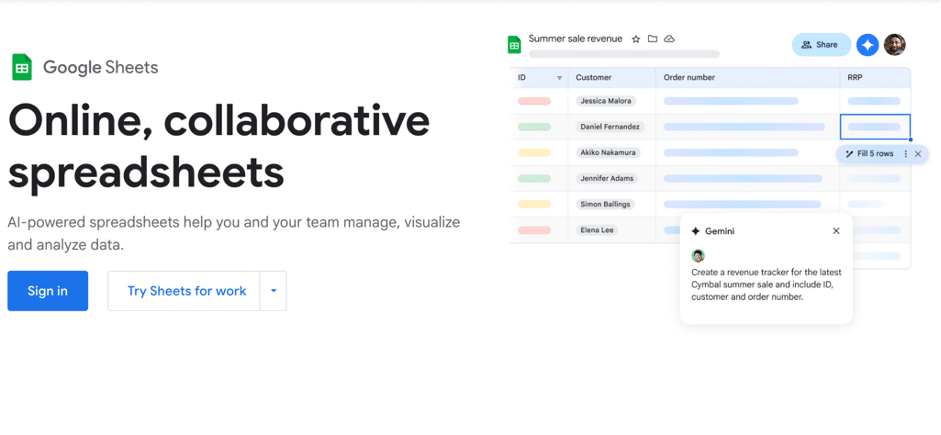As a young entrepreneur, your time, energy, and focus are your most valuable resources. Whether you’re running your first startup, building a side hustle, or managing a small team, staying aligned on your goals is everything.
That’s where OKRs (Objectives and Key Results) come in.
OKRs help you cut through the noise, stay focused on what matters most, and measure real progress – not just activity. But here’s the truth: most OKR tools are built for big teams, not builders like you.
So we put together a list of the 8 best OKR software tools for young entrepreneurs in 2025 – tools that are simple, powerful, and designed to help you grow without getting overwhelmed.
1. OKRs Tool – Best Overall for Startup Simplicity
If you want to set up OKRs fast and actually stick to them, OKRs Tool is your best bet. It’s clean, intuitive, and made specifically for startups and small teams – no fluff, no complicated onboarding, just focused goal-setting that works.

You can create your first OKR in minutes, track progress without spreadsheets, and see how you’re doing at a glance. One of the best parts? Pricing is based on team size, not per user, so you’re not penalized for growing.
Why It’s Great for Young Entrepreneurs:
- Simple enough for solo founders, powerful enough for small teams
- Team-based pricing that scales affordably
- Built to support focus and execution without distractions
2. Tability – Best for Building Weekly Goal Habits
Tability is perfect if you’re trying to build the habit of checking in on your goals regularly. It emphasizes progress tracking with weekly updates and visual dashboards – so you don’t lose momentum halfway through the quarter.
With a few clicks, you can update your key results, reflect on progress, and spot what needs your attention – all without spreadsheets or project management bloat.
Best for: Entrepreneurs who want to stay focused weekly without micromanaging themselves or their team.
3. Weekdone – Best for First-Time OKR Users
Just getting started with OKRs? Weekdone is like a goal-setting coach in your pocket. It guides you through setting clear OKRs and ties them into weekly planning, which makes sticking to goals much easier.
It also includes progress reports, team check-ins, and visual tracking – all with minimal setup. If you’re a solo founder or leading a small team, this tool helps you build structure early without feeling corporate.
Best for: Young founders looking to learn OKRs and build strong planning habits from day one.
4. SimpleOKR – Best for Clean, No-Fuss Goal Tracking
SimpleOKR is a lightweight, no-frills platform built for simplicity. It helps you set clear objectives, track key results, and keep everything in one place – without the clutter.

If you’re a solo founder or early-stage team, it’s a great step up from spreadsheets. The interface is intuitive, onboarding is quick, and you can start tracking progress in minutes.
Best for: Entrepreneurs who want a simple, focused OKR tool that’s easy to use and maintain.
5. SugarOKR – Best for Minimalist Founders
Not into flashy dashboards or endless features? SugarOKR is about as clean and simple as it gets. It’s perfect for solo entrepreneurs or small teams who want an easy way to track objectives and key results without overcomplicating things.
Set your goals, check in weekly, and get back to building. That’s it.
Best for: Founders who want a minimalist OKR tool that keeps them focused, not distracted.
6. Lattice – Best for Combining Goals and Team Performance
If you’re growing a team and also thinking about performance reviews, feedback, and employee engagement, Lattice lets you connect all those pieces. Its OKR feature integrates seamlessly with performance management tools, so you can build alignment and a healthy company culture.
It’s a bit more advanced, but if your startup is entering the growth phase, it can be a powerful all-in-one system.
Best for: Founders focused on people, team development, and aligning performance with goals.
7. Google Sheets + Manual OKRs – Best Free DIY Option
If you’re just starting out and want to keep it super lean, you can track OKRs manually using tools like Trello, Notion, or Google Sheets. Create columns for Objectives, Key Results, and weekly updates. It’s not fancy, but it works.

This is a great option for testing the OKR framework before committing to a dedicated platform.
Best for: Solo builders or bootstrapped teams who want to test OKRs without spending a dime.
8. Perdoo – Best for Strategy-Minded Founders
Perdoo is designed to connect company strategy to individual execution. If you’re thinking long-term and want to map out goals across your growing team, Perdoo gives you the structure to do that.
It includes visual goal maps, KPI tracking, and company-wide visibility – great if you’re building a bigger vision and need your team to see how their work fits in.
Best for: Young founders scaling their startup and thinking beyond the next quarter.
Final Thoughts
OKRs can be one of the most powerful tools in your startup toolkit – but only if the software fits your workflow, your team size, and your stage of growth.
Here’s a quick recap:
- OKRs Tool – Best overall for startup-friendly simplicity
- Tability – Best for building a weekly goal check-in habit
- Weekdone – Best for new OKR users and solo founders
- SimpleOKR – Best for founders who want a clean OKR setup
- SugarOKR – Best for minimalist founders and lean teams
- Lattice – Best for combining people, performance, and goals
- Trello + Manual OKRs – Best free DIY option for early testing
- Perdoo – Best for strategic founders scaling fast
No matter where you’re starting from, the key is to just start. Set one goal, track your progress, and build momentum. The right OKR tool can help you stay focused, move faster, and grow smarter.
